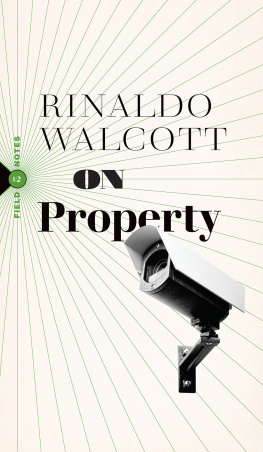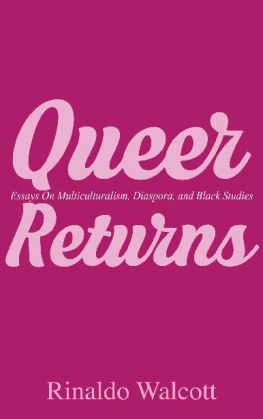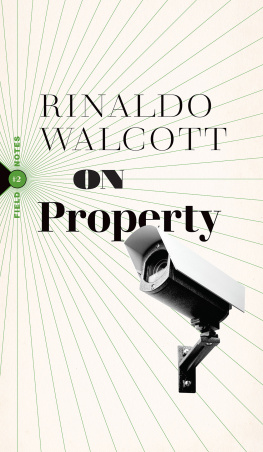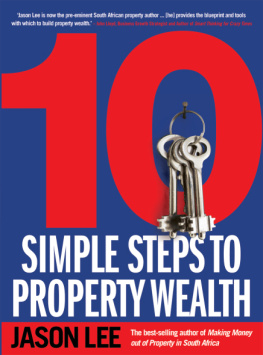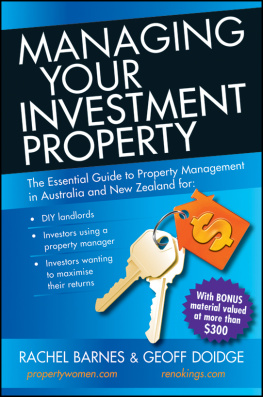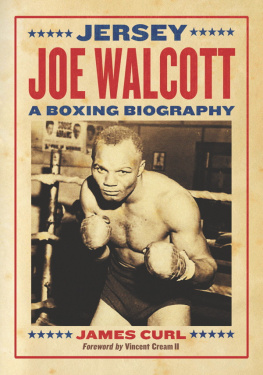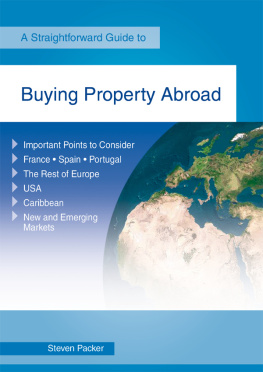Rinaldo Walcott - On Property
Here you can read online Rinaldo Walcott - On Property full text of the book (entire story) in english for free. Download pdf and epub, get meaning, cover and reviews about this ebook. year: 2021, publisher: Biblioasis, genre: Politics. Description of the work, (preface) as well as reviews are available. Best literature library LitArk.com created for fans of good reading and offers a wide selection of genres:
Romance novel
Science fiction
Adventure
Detective
Science
History
Home and family
Prose
Art
Politics
Computer
Non-fiction
Religion
Business
Children
Humor
Choose a favorite category and find really read worthwhile books. Enjoy immersion in the world of imagination, feel the emotions of the characters or learn something new for yourself, make an fascinating discovery.
- Book:On Property
- Author:
- Publisher:Biblioasis
- Genre:
- Year:2021
- Rating:4 / 5
- Favourites:Add to favourites
- Your mark:
- 80
- 1
- 2
- 3
- 4
- 5
On Property: summary, description and annotation
We offer to read an annotation, description, summary or preface (depends on what the author of the book "On Property" wrote himself). If you haven't found the necessary information about the book — write in the comments, we will try to find it.
On Property — read online for free the complete book (whole text) full work
Below is the text of the book, divided by pages. System saving the place of the last page read, allows you to conveniently read the book "On Property" online for free, without having to search again every time where you left off. Put a bookmark, and you can go to the page where you finished reading at any time.
Font size:
Interval:
Bookmark:

Rinaldo Walcott
Biblioasis
Windsor, Ontario
Enter On Property into humanitys tome of world-shifting ideas. In these concise pages, Rinaldo Walcott makes his unequivocal case for an abolitionist approach to the collective care and well-being of this world. His offering of ethical, political and philosophical clarity allows us to begin to renew our attention to the conditions and priorities of how we live together. Walcotts subtle genius is in how he brings this large idea to the street corner. Along with a host of vital thinkers born out of the catastrophe of the modern world, he imagines the future for this precarious planet as not only possible, but with a fullness of relation. This vision of the abolition of property brings with it a view of the commons as it is located in Black history and Black Life. So, it sees the whole world. Urgent, far-reaching and with a profound generosity of care, the wisdom in On Property is absolute. We cannot afford to ignore or defer its teachings. Now is the time for uscollectivelyto take up the challenge in this undeniable gift of a book.
Canisia Lubrin, The Dyzgraphxst and Voodoo Hypothesis
Provocative and persuasive. Rinaldo Walcotts insightful unmasking of the historic baggage associated with private property challenges us to face up to what might be the source of our most pressing social problems.
Cecil Foster, They Call Me George
Rinaldo Walcott is one of the most renowned and dynamic articulators of the Black radical tradition. His writings are essential for anyone seeking deeper engagement with the social and political movements urgently afoot today.
David Chariandy, Ive Been Meaning to Tell You
Set the captives free.
Bob Marley
But I know change gonna come, oh yes it will.
Sam Cooke
Dont you know
Theyre talkin bout a revolution.
Tracy Chapman
I was born in the Caribbean and have lived most of my life in Canada, specifically Toronto. I was always interested in politics, even when I did not have a language for that interest. I still recall, as a child in Barbados, the moment when Rastafarians began to show up in larger numbers on the island. They were immediately accused of being, and treated as if, mad. Their smoking of marijuana as a sacrament was criminalized and the religious and spiritual practices they performed were almost universally frowned upon. The Rastafarians sought to liberate themselves from their oppression in the Americaswhich they renamed Babylonby practicing a politics fully conscious of both the historical and ongoing suffering of Black people. They called this downpression, since there was nothing up about it. Rastafarians often renamed ideas to give them a more pointed, clearer meaning. The spirit of abolitionism, the first time, perhaps, Id come across it, was encapsulated in their oft-repeated phrase fire go bon Babylon (fire will burn). I realized that for Rastafarians abolition wasnt something of the past: it was an ongoing, contemporary movement, that would not be over until Black people everywhere were free, equal and safe. Rastafarianism was infused with a rebellious spirit that has shaped my worldview. Rastafarian refusal of a wide range of knowledges and their invention of new ways of being together have stayed with me as a powerful practice of self-determination. Their influence is marked on my body by my wearing of dreadlocks, but more importantly, their example of reinvention has marked my thinking. I invoke the Rastafarians here, at the beginning of this essay, because they represent for me how transformation can happen in the midst of ongoing forms of subjection and suffering. But I also invoke them because, as I have come to better understand the stakes of abolition, I believe their refusals to be one of its foundations.
One of the most important aspects of Rastafarianism, which has stayed with me all this time, is its irreverence for individual property. Rastafarians live communally, if patriarchally, and in so doing eschew property, believing it presents a significant ethical problem. Their irreverence has taken many different forms. What I learned from Rastafarians, even if I could not put it into words as a child, was that property was more generally a problem for Black people. Moreover, when wrapped in individual as opposed to collective ownership, property brought with it tremendous violence. I still recall too many images of young Rastafarian men being taken away by police and mental health workers, who claimed that they were either mad or criminal or both for liberating, as they called it, fruit from trees, even abandoned trees, or for smoking cannabis. When asked how he could justify his extreme wealth and possessions, Bob Marley, the most famous Rastafarian of them all, famously retorted: Possessions make you rich? I dont have that type of richness. My richness is life forever. Marley succinctly captured Rastafarian philosophy with these few pithy words. It is this approach to life, borrowed from the traces of Rastafarian philosophy, that has characterized my own philosophy ever since.
Growing up as I did in a post-slavery society, where one is acutely aware of ones status as the descendant of slaves, there exists a largely unspoken but palpable understanding within the Black community about property and its relationship to abolition. It was still illegal in my Barbadian childhood to take a few pieces of cane from the fields, a crop that had even then been in decline for many years. The irony of this shouldnt be lost on anyone. Sugarcane was the crop that historically led to the enslavement of Black people on that small island; it was because of the cane that it came to be their home. Indeed, in my youth, plantations still hired watchmen and even policemen (at that time they were always men) to make sure that those living near cane fields didnt take a few stalks for their personal enjoyment. This too has lingered with me ever since, and I reflect on it often. It has given me a better understanding of the sometimes hidden relationships and practices around property that have marked it in my mind as a serious societal problem. And its also part of the rationale for why I have come to believe that, in the Americas but also across what we call the West, Black people will not be fully able to breathea word I do not use lightlyuntil property itself is abolished. What is these days termed abolition politics is, I am going to suggest, the route to Black peoples full breath.
When I heard about George Floyds final plea for breath in Minneapolis, Minnesota, on May 25, 2020, it seemed at first merely one among many other deaths in recent years. But it also immediately reminded me of Eric Garners similar plea when he died at the hands of police for selling loose cigarettes on the street in New York City on July 17, 2014. And these deaths linked up with other recent ones, of Trayvon Martin in Florida and Mike Brown in Ferguson, Missouri, and Jermaine Carby in Peel, Ontario, among so many others before and alongside them. But Floyds death in the midst of the pandemic seemed to reignite the call for the urgent transformation of Black peoples encounters with police, as well as of policing, in a manner more broadly construed. The COVID-19 pandemic had already set in motion numerous demands for change and for a reckoning with how we live in North America and much of the Western world, and the images and reports around Floyds death seemed to increase the likelihood of yet another reckoning. That a Black man could be openly killed in the streets by state-sanctioned authority for passing a counterfeit twenty-dollar bill was not surprising to me. It was a sad truth. We had seen it before, but in a pandemic in which the possibility of death was heightened for all of us, it seemed to ring differently. Why that is the case I do not know. But Floyds death also affirmed what many Black people like me already knew: that we have a different relationship to property and its meaning than white people and many other people of colour do. This, too, should not be a surprise to anyone. The issue of property sits at the centre of Black peoples relationship with policing both past and present, and it is central to making sense of why more and more Black people, alongside others who support our communities, called for the defunding of the police, prisons, and the entire judicial system in the wake of George Floyds murder. An abolitionist future is not possible without the abolition of police. And it is my contention that this is not possible without the abolition of property.
Font size:
Interval:
Bookmark:
Similar books «On Property»
Look at similar books to On Property. We have selected literature similar in name and meaning in the hope of providing readers with more options to find new, interesting, not yet read works.
Discussion, reviews of the book On Property and just readers' own opinions. Leave your comments, write what you think about the work, its meaning or the main characters. Specify what exactly you liked and what you didn't like, and why you think so.

